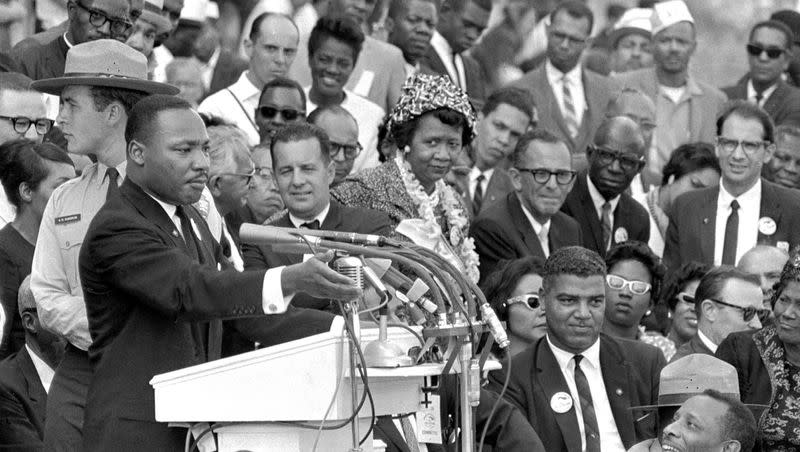Opinion: What people of faith can learn from MLK’s ‘I Have a Dream’ speech 60 years later

- Oops!Something went wrong.Please try again later.
“No, no, we are not satisfied, and we will not be satisfied until justice rolls down like waters, and righteousness like a mighty stream.”
Surely after the winter we have just had, this imagery used 60 years ago by the Rev. Martin Luther King Jr. as part of his “I Have a Dream” speech, can resonate with all Utahns. In the past season, we have all witnessed the power and inevitability of water rolling off our mountains. While many did their part to help mitigate the effects of the flooding — filling sandbags, clearing trees — we all understood that the waters were going to come; and while we could shape them, we could not stop them.
Freedom fighters in King’s era 60 years ago also viewed the quest for racial equality much in the same way. Many held fast to principle six of King’s Principles of Nonviolence, that “nonviolence believes that the universe is on the side of justice.” Each Freedom Fighter had faith in the inevitable arc of the universe toward justice, which gave them the foundation on which they could stand and a source of strength they could draw from in the face of adversity.
Said congressman and civil rights leader John Lewis, “We believed that if we were the children of an omniscient creator, and we took a stand based on faith, that the forces of the universe would come to our aid.” Like water rolling out of the mountains, Lewis and others did not view themselves as creators of the movement but rather as “actors dramatizing (their) faith in the supremacy (and inevitability) of one truth.” In other words, they had a perfect brightness of hope.
In an increasingly polarized and secular world, it may seem odd to some to pair the work of religion and civil rights. It’s my experience that many people of faith today, especially those of younger generations whose peers tend to be increasingly irreligious, feel unsure about their role in civil rights work. Some even go so far as to say that the two ideologies feel at odds. Yet in the 1960s, a majority of the Civil Rights Movement’s leaders were pastors, not politicians. Lewis attributed this to the fact that “religious faith is a powerful connecting force for any group of people who are working towards change.” King similarly observed that there is a power in “(rising) to the majestic heights of meeting physical force with soul force.”
Related
In the present act of the Civil Rights Movement, with the connection between religion and civil rights dwindling, it begs the question: What role will people of faith play? Will we assert our faith in our divine heritage linking us to every other human being and the rest of creation? Can we stand on that faith, trusting that the forces of the universe will come to our aid?
While we often remember King’s speech for the vision of America he lays out — one of peace, prosperity, unity and equality — he also gives a model people of faith can use to affect social change:
Conduct your struggle on the high plane of dignity and discipline.
In the process of making right, do not be guilty of wrongful deeds.
Do not satisfy your thirst for freedom drinking from the bitter cup of hatred.
Do not walk alone, and always march forward not back, never wallowing “in the valley of despair.”
This framework, combined with the faith and hope that the arc of the universe bends toward justice, can form a solid foundation upon which people of faith can engage and carry the torch of justice and civil rights into the future.
As we continue to “make real the promises of democracy” and “lift our nation from the quicksand of racial injustice to the solid rock of brotherhood” the role of people of faith is more important than ever to make justice a reality. Each of us has the power to use our faith to keep King’s dream alive, having a perfect brightness of hope in a better and more equitable world.
Michael Nixon is a Utah native and a member of Utah’s Martin Luther King Jr. Human Rights Commission. He writes this opinion as a private citizen and the views expressed here are solely his own.
